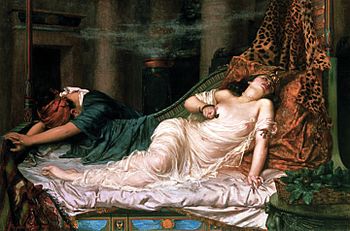 |
| Cleopatra by Michelangelo |
Now let's talk about Cleopatra, her full title being Cleopatra VII Thea Philopator, the last pharaoh of Ancient Egypt. She shows herself off as the reincarnation of Isis, although actually her family came from Greece, and started their reign over Egypt after the death of Alexander the Great. Unlike her stubborn "Greek to the bone" family, Cleopatra learned to speak Egyptian. In order to solidify her throne, the empress allied with Julius Caesar. They had a son, Caesarion. As far as I'm concerned, this had been quite a political marriage and was done to increase the power on each side.
After the assassination of Caesar, Cleopatra aligned with Mark Antony quite naturally for he was supposed to rise to the shrine as the legal heir. Unfortunately Octavianus aka Augustus proved to be better in battle than anyone else. Antony and Cleopatra ended up both committing suicide.

Augustus, after founding Roman Empire, led the country to a period of relative peace until his death at the age of 75. Impressive life span considering the time! There are two sets of his last words. "Behold, I found Rome of clay, and leave her to you of Marble."were the quotes on public documents, while the better known line was "Have I played the part well? Then applaud as I exit."
Groves of Illyria; Dales of Attica; Vales of Tempe; Those were once the favourite hangout places for gods and goddesses like Apollo and Athena. The best advantage of pagan religion is that you can find traces of gods and see the mystified places with your own eyes. It's highly credible when you see the paths Apollo had once take along the river that goes into the Aegean sea, or see the forest where Artemis used to hunt with her sisters.
In the mountains of Parnassus, the oracle of Delphi was pronounced. It was all too easy to believe those fantastical tales and magnificent stories as the glory of nature towering above as your journey carries on.
The Albanian Chief Harold were to meet, was indeed Ali Pasha, the man of Lion that Byron spent some time with in Albania. The infamously cruel and tyrannic ruler of Ottoman Albania was widely known as an alert leader which led Albania against Sultan reign. I'm sure Byron respected what Ali Pasha did and cheerfully accepted his warm welcome and overwhelming gifts and what now, but also disdained his cruelty.
"His Highness is a remorseless tyrant, guilty of the most horrible cruelties, very brave, so good a general that they call him the Mahometan Buonaparte ... but as barbarous as he is successful, roasting rebels, etc, etc.."In a letter dated Nov. 18th, 1809, Byron included such words to his mother after greeting the notorious ruler. There is, still, some indication of admiration between the lines, as we remember the poet's personal hero Napoleon Bonaparte, became a legendary name Ali Pasha got crowned with.
In Travels In Albania and Other Provinces of Turkey in 1809 & 1810, John Cam Hobhouse also talked about the monks they met in the mountains. Here's a clip from the book:
The 20 something young hermit told the travelers about the life in the monastery, as the conscientious Hobhouse listened in astonishment. Byron would have had a different perspective, having mentioned several convents in the mountains, etc. in the previous canto. See my post about Convento Dos Capuchos in A Laughable Disgrace (Canto I: XXI-XXVI).
The rude caloyer here, of course, was the same one who threw rocks to anyone who interferes with him and wouldn't talk to anyone all day long. He tends his herds and minds his own business, completely becomes one with nature. An eccentric being to most people, he is indeed living as freely as he wishes... the kind of delight he holds in his heart wouldn't be understood save for few.





No comments:
Post a Comment